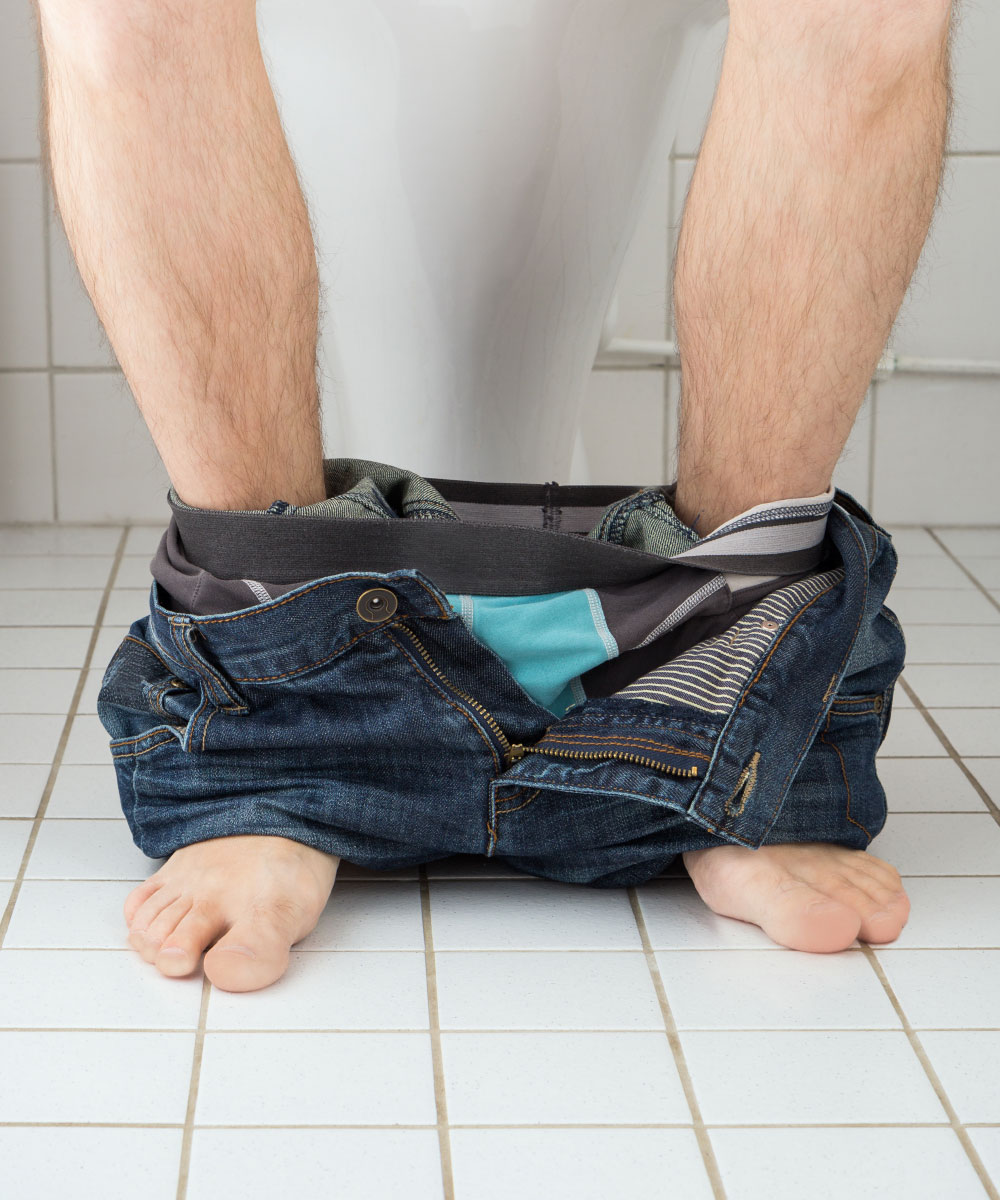
Everybody poops—but nobody wants to talk about it.
Seriously. Everyone has a story—bloating, fatigue, brain fog, constipation, diarrhea—but no one wants to be the poster child for bathroom frequency. Which is why everyone requested anonymity. Still, if you’ve ever felt “off” after a weekend of indulgence, you’re not alone. Your gut might be trying to send a message, and it’s more important than most of us realize.
Dr. Jamin Brahmbhatt knows this firsthand. A board-certified urologist with a personal interest in gut health— he jokes that he’s a “human plumber”—but the work he does runs deeper than pipes and plumbing. “I’ve personally dealt with gut issues and even underwent a colonoscopy earlier than typically recommended,” he says. “Through that experience, I discovered what foods affect me and what makes me feel my best. When I eat right and prioritize my gut, my sleep, mood, and overall energy noticeably improve. Gut health isn’t just theory for me—I’ve lived it.”
That experience opened his eyes to something more: gut health isn’t just about digestion. It’s about everything else too—your immunity, your mood, how rested you feel in the morning, even your ability to handle stress. “Your gut acts as your body’s ‘second brain,’” he explains. “About 70% of your immune system lives there, and your gut bacteria play a major role in regulating inflammation, stress response, and sleep.”
It’s no wonder interest in gut health has exploded—everywhere from doctors’ offices to your TikTok feed. But as Dr. Brahmbhatt warns, “Not everything trending online is scientifically proven or universally effective. Always prioritize personalized, evidence-based advice.”
When the Gut Talks, Listen
That advice came just in time for Emily*, a local teacher who, despite eating what she thought was a clean, healthy diet, found herself constantly bloated, constipated, and barely keeping her eyes open by mid-afternoon. “It was so frustrating,” she says. “I felt like I was doing everything right, but I was exhausted and uncomfortable all the time.” A visit to a nutritionist revealed what her gut had been trying to say all along: she needed more balance—less ultra-processed food, more fermented foods, and better hydration. “Within weeks, my energy improved, the bloating went away, and I finally felt like myself again.”
Jake*, a prominent attorney, had a different story—but a familiar outcome. “I just assumed my stomach pain was from stress,” he says. “Late nights, too much coffee, barely enough sleep—I lived in survival mode.” But after a brutal bout of acid reflux, he swapped his afternoon espresso for herbal tea and began practicing mindfulness daily. The change was swift. “My body just felt calmer. I wasn’t constantly bracing for discomfort.”
Then there’s Mia*, a local college student, who didn’t have gut pain at all—but couldn’t figure out why her eczema kept flaring up and her sleep was wrecked. “I’d wake up feeling like I hadn’t rested at all,” she says. A naturopath helped her connect the dots: her gut was inflamed, and her diet was too heavy in sugar and dairy. Small shifts—like adding prebiotics and cutting back on sugar—made a noticeable difference.
As Dr. Brahmbhatt explains, signs of an unhappy gut aren’t always what you’d expect. Sure, there’s bloating, gas, and irregular digestion—but also skin flare-ups, low energy, chronic inflammation, sleep disturbances, and even hormonal imbalances. “One big misconception is that gut health only matters if you have stomach problems,” he says. “But often, the signs are more subtle. Mood swings, poor sleep, unexplained weight changes—all of these can be tied to the microbiome.”
Gut-Healthy Habits That Actually Work
So what can you actually do? The answer isn’t extreme—no juice cleanses or supplement hauls required. Start by eating more fiber—25 to 30 grams a day—along with probiotic-rich foods like yogurt, kefir, or kimchi. Drink more water, move your body, and, yes, sleep more. “These simple habits can make a real difference over time,” Dr. Brahmbhatt says.
And if things still feel off? It’s worth seeing a professional. “Persistent digestive issues, noticeable changes in bowel habits, blood in your stool, or symptoms that interfere with daily life are all reasons to seek help,” he adds. “Even recurrent urinary problems can be tied to gut health—something many people don’t realize.”
Gut health may not be glamorous, but it is foundational. And the best part? Getting it right doesn’t have to mean an overhaul. A few small tweaks can lead to big changes—more energy, better sleep, and a body that actually feels good to live in.
So next time your stomach speaks up? Listen. Your gut has a lot to say—and it might just change everything.

“When I eat right and prioritize my gut, my sleep, mood, and overall energy noticeably improve.”
Wellness Counts
60
million people suffer from digestive disorders like irritable bowel syndrome (IBS) and Crohn’s disease.
SOURCE: UCLA Health, NIH, American Gastroenterological Association
40%
of Americans have skipped a social activity due to gastrointestinal symptoms such as constipation or diarrhea.
SOURCE: UCLA Health, NIH, American Gastroenterological Association
1,000
species of bacteria are in the human gut microbiome, and each of them plays a different role in your body.
SOURCE: UCLA Health, NIH, American Gastroenterological Association
2-5 lbs
altogether, these microbes may weigh as much as 2–5 pounds (1–2 kg), which is roughly the weight of your brain.
SOURCE: UCLA Health, NIH, American Gastroenterological Association
Gut Health, Explained
with Dr. Brahmbhatt, Vice Chief of Staff at South Lake Hospital / Orlando Health
What exactly is gut health—and what is the microbiome?
Gut health refers to the balance of bacteria and microorganisms living in your digestive tract, collectively known as the gut microbiome. These microbes play a critical role in digestion, nutrient absorption, immunity, and even mood and energy levels. Simply put: a balanced gut equals better overall health.
Why is everyone suddenly talking about it?
Awareness has surged thanks to new research linking gut health to everything from immunity to mental well-being. Social media has also played a role, turning probiotics and kombucha into wellness staples. But beware: not all trends are backed by science. Stick with personalized, evidence-based guidance.
What are the biggest misconceptions?
One major myth: gut health only matters if you have obvious digestive issues. In reality, imbalances can show up as fatigue, mood swings, skin problems, or weight changes. Another common mistake? Thinking a probiotic supplement will fix everything. True progress comes from long-term dietary and lifestyle changes—ideally with professional support.
What to Know Before You Supplement
Do you really need a probiotic?
Not necessarily. “A common misconception is that probiotics or supplements quickly fix imbalances,” says Dr. Brahmbhatt. “Real improvements come from sustained dietary and lifestyle changes, ideally guided by a health professional.” If you have chronic digestive issues, a high-quality probiotic may help—but check with your doctor first.
When should you see a specialist?
Persistent digestive issues, changes in bowel habits, blood in your stool, unexplained weight loss, or symptoms that disrupt your daily life all warrant medical attention. “From a urologist’s perspective, recurrent urinary issues can sometimes point to gut health concerns,” adds Dr. Brahmbhatt. “It’s one more reason not to ignore what your gut is telling you.”
Trending now: the gut health glow-up
Curious about what’s new in the world of gut wellness? These tools and treatments are on the rise:
At-home microbiome tests – Analyze your gut bacteria and get personalized recommendations.
Postbiotics – The beneficial compounds your good bacteria produce—now being studied for their own health perks.
Customized nutrition plans – Tailored to your unique microbiome for a more targeted approach to gut health.





